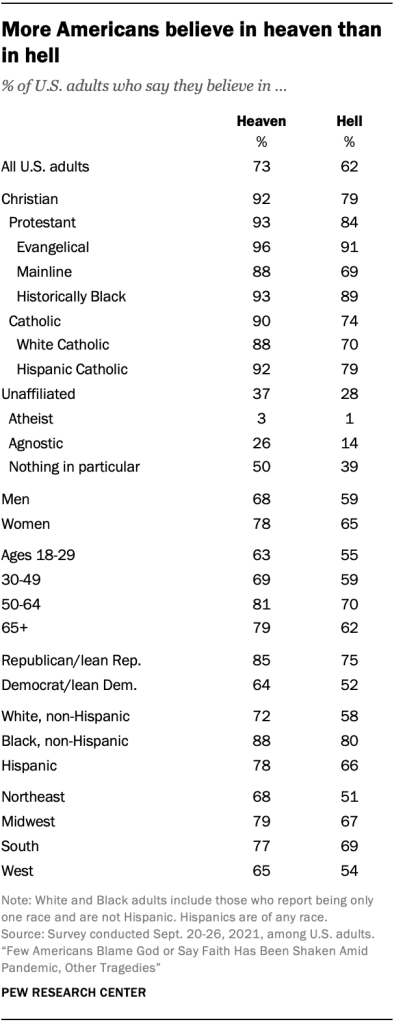
During a Sunday school class, the two of us – a retired preacher and a professor – enjoyed spirited discussions on faith when the topic turned to the concept of an afterlife and the extent to which personal beliefs may steer our actions. Our conversation revolved around one profound question: How do our beliefs about the afterlife influence our actions on earth?
Many decades ago, Clay, then a junior high school student, decided to leave his evangelical church and become a pastor in a different denomination. What followed was an invitation to meet with two church elders who informed him in no uncertain terms that his action would lead him to Hell.
Similarly, as a young husband and father, Don relocated his family several times and visited multiple churches seeking the best fit for his family of four. During more than one sermon, ministers called out behaviors that would assure an afterlife with the Devil. Some of those behaviors included failing to give generously to the church, allowing young daughters to wear shorts, and divorcing a spouse.
Members of the Sunday school class shared similar experiences.
When discussing how our beliefs about the afterlife influence our actions in life, some would suggest it is sacrilegious to even ponder questions about the afterlife. We disagree and hope to offer a narrative to inspire objective thinking about the afterlife and how our beliefs can influence our lifestyles.
As such, there will be no attempt to alter notions about the existence of the afterlife be it Heaven, Hell, or neither. Rather, we will explore why we believe as we do and how we might be different if the afterlife was nonexistent. The five most-followed world religions – Judaism, Christianity, Islam, Buddhism, and Hinduism – each teach spiritual survival after death, but disagree about origin, journey, and destination. The Christian faith will be the focus of this narrative.
John Lennon offered us an interesting starting point with his song “Imagine”: “Imagine there’s no heaven; It’s easy if you try; no hell below us; above us, only sky; Imagine all the people living for today.”
The World Factbook indicates there are more than 2.5 billion Christians in the world while Pew research findings tell us some 205 million reside in the United States. Pew reported a decline in self-identified Christians from 75% to 63% during the last decade. According to Gallup News Service, 81% of Americans believe in heaven while only 7 in 10 accept the notion that there is a hell.
The lack of consensus about the existence of a rewarding afterlife and some type of eternal torment begs reflection. How can we explain this difference?
Common sense points to four broad afterlife viewpoints. The first is that there is no Heaven or Hell and when our bodily functions cease, that’s all. Proponents include atheists like Stephen Hawking, as well as some Christians.
The next view is that Heaven exists for those who follow Jesus and Hell for those who reject him. Those who follow this perspective think that all non-Christians will be condemned no matter how virtuous their life may be. A recent Pew poll shows about half of all Christians in the U.S. believe that some non-Christians can go to heaven. This viewpoint is the most prevalent among Evangelicals.
A more secular notion revolves around the idea that being a good person is enough to be admitted to Heaven regardless of their stated beliefs (approximately 39% of the U.S. adult population). And lastly, the universalist view is all humans will eventually enter Heaven – with the possibility of some sort of trial to purify the soul.
We’ve heard about individuals who described beautiful sensory phenomena during near-death experiences, but they lack consistency as well as the ability to stand up to scientific validation.
Some of the work by the noted evangelical Anglican author Alan Jacobs offers a sound rationale for how we develop our beliefs and why we think the way we do. He supports the position that it is impossible to think independently of others because everything we think is in response to what someone else thinks or says.
One clergyman who examined the Gospels found just under 2,000 verses containing words attributed to Jesus. About 10% of them referenced a heavenly place, eternal life, or the coming kingdom while only about 3% either directly or indirectly referred to an undesirable afterlife without ever using the term. If those counts are even close to accurate, ministers would have three times more opportunities to focus on Heaven in their sermons. As such, Jacob’s thinking makes sense since so many of us are bombarded by more mentions of Heaven during Sunday mass, Bible study, or any manner of religious conversation.
Jacobs goes on to argue that thinking is a social process of accepting concepts put forth by those who have earned our approval or rejecting beliefs by those we don’t support. Agreement generates internal feelings of comfort and objectivity; disagreement brings out “there must be something wrong” reactions and defensive responses. This makes an agreement with the afterlife easy as we can readily embrace afterlife views offered by those who are deemed to be good and pure in their motivations. Sunday school lessons and sermons offer abundant opportunities.
So, in closing, do we choose “good” rather than “bad” behaviors because of our desire to enter Heaven or avoid Hell? In short: it really depends on who you ask. Take one look at the Internet and you’ll find devout Christians who proclaim that their actions are profoundly impacted by their faith. Atheists and others say that they strive to be good people irrespective of religion.
In truth, the question itself may be moot, but it deserves reflection, nonetheless.

Dr. Don Clardy
Dr. Don Clardy is a tenured professor with 40+ years in higher education.
Rev. Clay Cook
Rev. Clay Cook is a retired pastor with degrees in education and divinity along with 40+ years in the ministry. The two are colleagues who have been members of the same Presbyterian church for more than 25 years.









